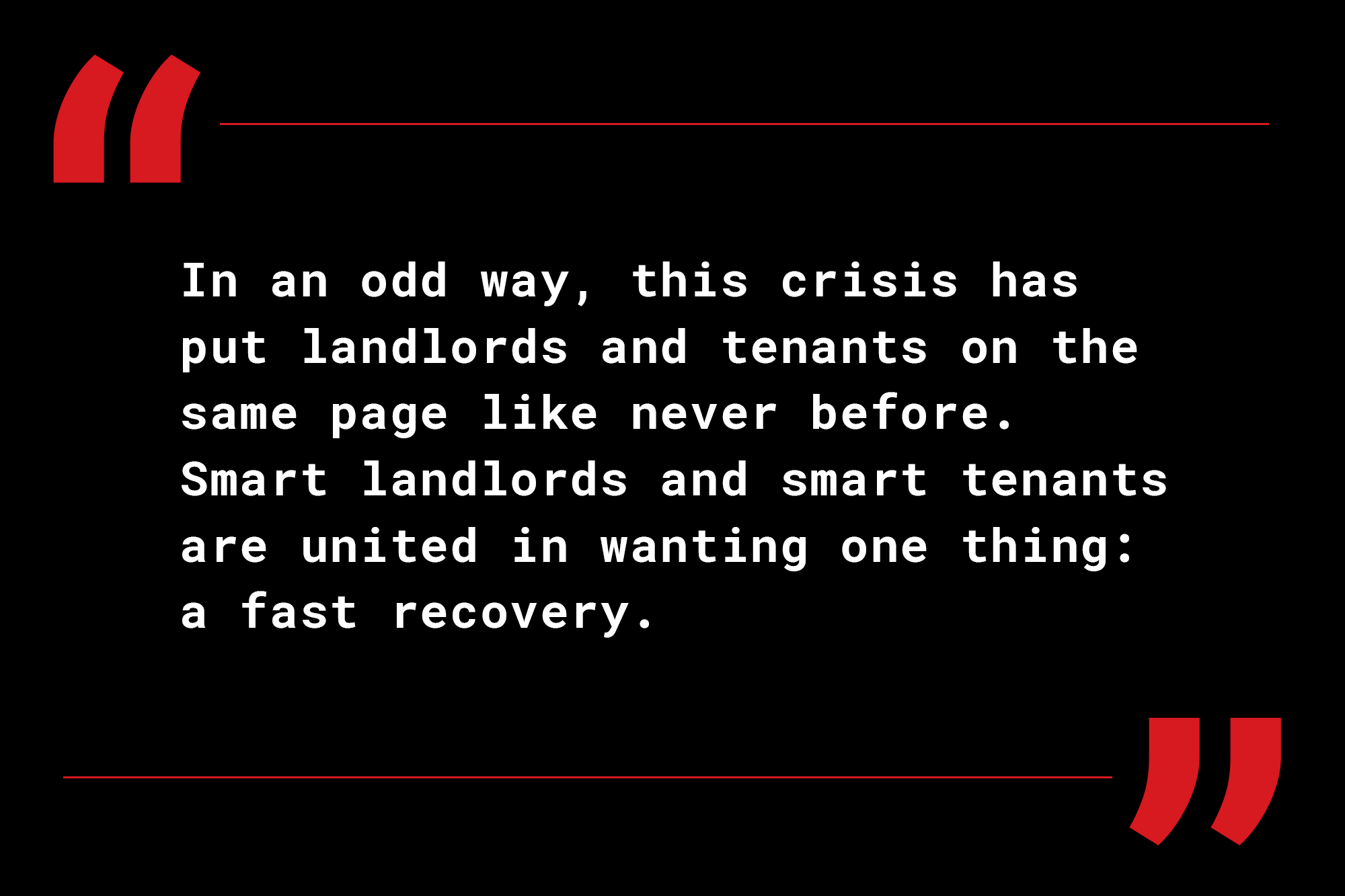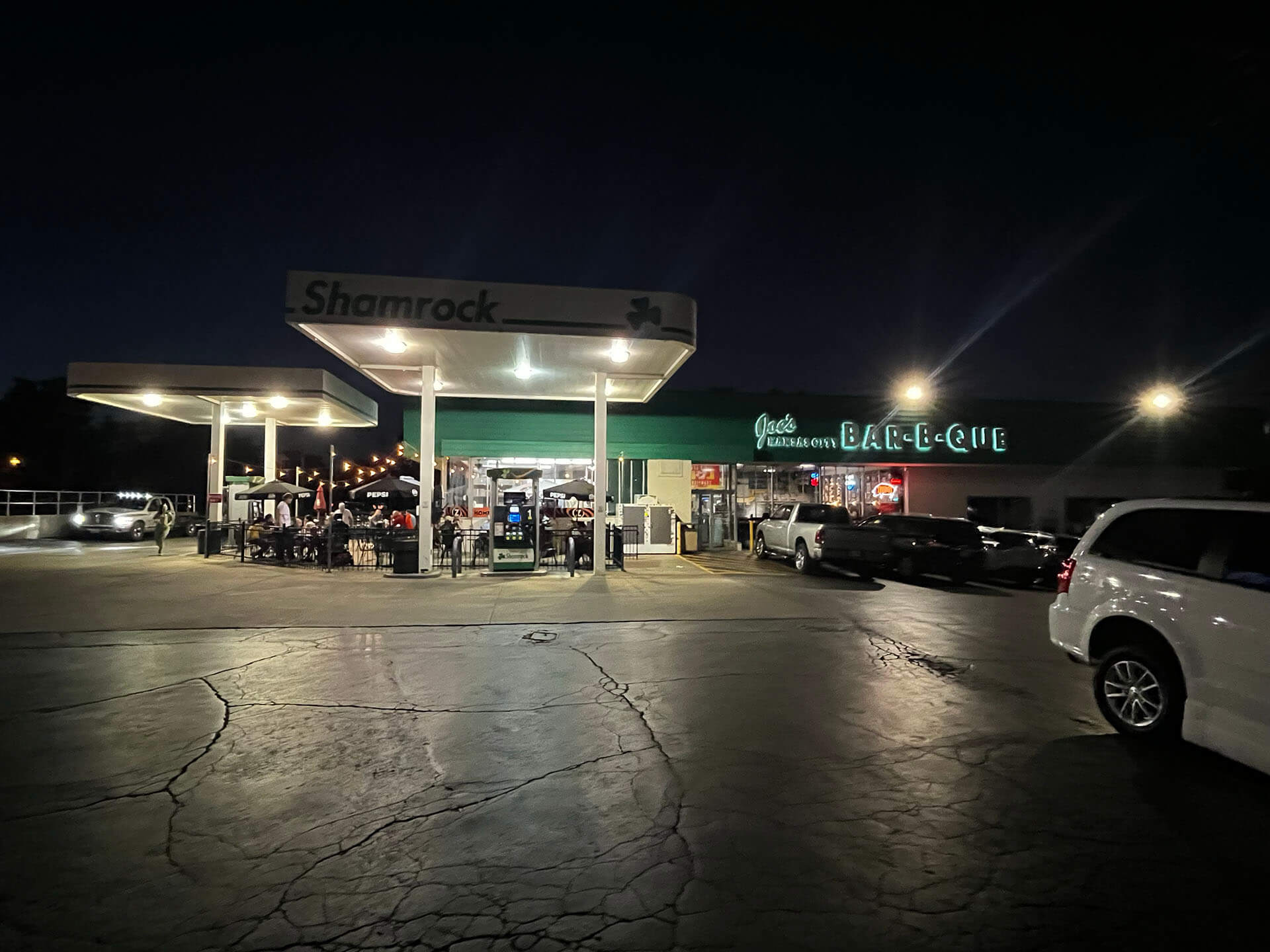Update #4: Tenant Realities & Planning
Dear Clients & Colleagues,
Good evening and happy Monday.
The two big issues we were tracking last week and through the weekend were (i) the Paycheck Protection Program under the CARES Act (“PPP”) and (ii) legislative progress and related issues re: Business Interruption Insurance in MA and elsewhere. Herein I will share some high-level notes on both, with the caveat that Graffito is not in the business of providing legal, tax or accounting advise; I leave this to your respective experts. My focus for this email this evening is instead to flag a few important issues for you to consider as your landlord/tenant relationships continue to evolve in the coming days and weeks. This email is therefore organized as follows:
I. Tenant Planning (and LL visibility into such)
II. Business Interruption Insurance (quick recs and updates)
III. PPP Realities (for retailers)
IV. Other Stuff We are Thinking About
Tenant Planning
Despite the intense ambiguity regarding post-COVID-19 health, economic and political realities, tenants still need to be planning for the weeks and months ahead. And they need to be communicating with their landlords about such. Some baseline questions for tenants include: are you applying for funding under PPP; how many months – or weeks – of runway do you have to keep things going at your current state; what is your reopening plan and, if still open, how long can you continue with take-out, delivery and other essential services; etc. While many tenants will push back on these lines of questioning with a “we are just trying to survive day-to-day” response, I assure you that top-notch tenants are actively thinking about all of these questions right now. They may not have an actual plan or answers yet, but they are indeed evaluating how to deploy capital in the future, what Summer 2020 might look like, and what the biggest obstacles to recovery are. Each tenant has certain unique challenges, and you the landlord will be well served to understand them.
In prior emails to this group I have stressed the need for landowners to understand and work with tenants on rent relief and the relaxing of other lease covenants. At the same time, we are just as urgently telling tenants that they must be actively sharing and planning in good faith with their landlords. In an odd way, this crisis has put landlords and tenants on the same page like never before. Smart landlords and smart tenants are united in wanting one thing: a fast recovery. Part of this recovery involves ongoing consideration and tracking of the two issues I flagged above: (1) PPP and (2) Business Interruption Insurance legislation; the later of which is the easier one to tackle, so I’ll start there.
II. Business Interruption Insurance
I’ve written a lot on the blog about business interruption insurance, starting with a post on 3/18 about why it likely wont be a remedy for tenants (and thus landlords), but more recently advising that all tenants should still file a claim with their respective insurance provider . Note there is a landlord role here too: landlords should ensure all of their tenants have filed claims and received denial letters. Denial letters may be threshold to future class action lawsuits and/or legislation-triggered recovery. I raise this here for you now because we at Graffito have found that most small, local, owner-operated business have still not filed claims. This is a mistake. Flag this for your tenants. Now.
As many of you know, two weeks ago legislation was filed in MA to require insurance companies make certain policyholders whole through business interruption insurance claims even if specific policy language carves-out pandemics and requires direct “physical damage.” Similar legislation has been filed in NY, NJ, Ohio and other states will follow this week and into next. Most of these bills are unlikely to pass into law, but they have spurred talk in D.C. about potential federal action. The most likely (and promising) outcome here to ensure claims reimbursement for retailers under BII is indeed through federal funding that provides an economic backstop to insurance cos. and thus allow them to pay policyholders. It is my understanding that there was similar action, though on a far smaller scale, post September 11th and in the wake of Hurricane Sandy. We will be watching this closely in the coming weeks and it is perhaps the best chance retail tenants and their landlords have at some recovery for the months of lost income and rent as a result of COVID-19 closures. I say that this is the ‘best chance’ because, for retail tenants, PPP likely isn’t saving any of them…
III. PPP Realities
PPP is about keeping people employed and off unemployment (thus “paycheck protection”). It is great for service businesses and professional firms, all of which are hit hard by the current economic crisis but will most likely have a faster path to recovery than retailers. In fact, I know of numerous small businesses that delayed layoffs because of PPP. This is the intent, and it will work well for some. But what about those business that need more than 8 weeks of assistance? What about the retailers, restaurants, and their vendors that took the hit the hardest, the earliest, and will likely be the slowest to recover?
It is almost impossible to imagine retail and restaurants returning to business as usual in 8 weeks. So I’ll just say it: sales for most retail and almost all entertainment and food service businesses will not return to pre-COVID levels anytime in 2020. And, further, these business have already laid off staff — mass layoffs in retail started in mid-March. Accordingly, to get the full benefit of the forgiveness provisions in the PPP, these businesses must go through the process of rehiring to pre-COVID payroll levels. Is this realistic for retailers? Probably not.
There are some recommending that retailers should just rehire for 8 weeks to get the benefit of PPP and then go through layoffs again in 8 weeks if they need to (and they will need to)… But does this this make sense? Also, probably not. Further complicating this line of reasoning is that unemployment benefits at the moment, recently bolstered by emergency funding, are relatively strong. Therefore, does the line-cook or sales clerk want to come off unemployment for just 8 weeks to work at little, if any, economic gain and then have to go through the hassle of filing again for unemployment this summer? Again, probably not…
Despite the above realities, some landlords are considering requiring retail tenants apply for PPP as a condition for rent flexility in May and June. I get this. And frankly I didn’t hate it at first glance. The reason it makes some sense is that the PPP max loan amount calc is 2.5 months of the applicants average payroll for the prior 12 months, which shall paid out over 8 weeks for forgiveness. So, in theory, there are 2 weeks worth of PPP funds left over that can be forgiven if paid towards other allowed expenses, such as rent and utilities. So this is something… and while perhaps not realistic given all the “probably nots” above, it is for sure something you should be talking to your retail tenants about. They may just have a plan… and maybe in this plan there is money for rent. It is possible, but we aren’t super hopeful (yet).
We’ll have more thoughts and perspectives on PPP on the blog this week.
IV. Other thoughts for the week ahead
COVID-19’s impact on retail real estate will force us all to delve deeper into our tenant’s businesses than perhaps any of us ever have. It’s not going to be pretty, but it is wildly necessary. aIf you aren’t yet an expert on percentage rent, now is a good time to study up. If you previously required all your retail tenants to use union labor for Tenant Improvements, maybe it’s time to revisit this. Does your form lease preclude tenants from subordinating lessor’s interest in the leasehold to lenders, thus limiting your tenant’s options for obtaining debt? Is your Permitted Use provision narrowly tailored in a way that may hinder a tenant’s ability to pivot into new post-COVID business practices that bring in additional revenue? How is your assignment provision written and does it afford tenants optionality in taking on new partners?
In sum, now is the time for us to revisit leases and answer some of the above questions with an eye towards the future. Do this for both current deals and also start brainstorming creative solutions for post-COVID-19 challenges and leasing needs. We’ll certainly be thinking about all of this at Graffito this week. And we are excited to report back to you soon on the blog and in update #5,
/Jesse





April 7, 2020 10:50 am /
There’s no question that PPP Was rushed along and that it’s implementation is awkward and the program is likely to run out of money. That said, we did apply for the loan hoping that the rules for spending the money on payroll will be modified to allow us to start spending once we are able to re-open (not in an eight week period that doesn’t overlap with business activity).